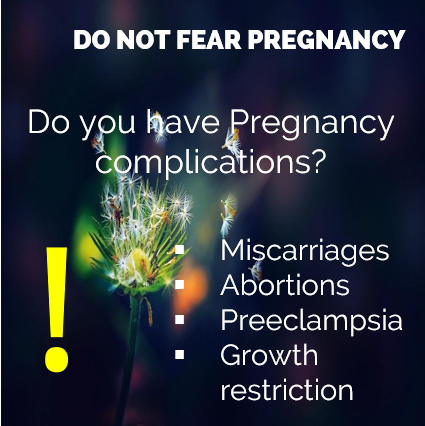SERPINE1 in Thrombophilia
SERPINE1 gene encodes plasminogen activator inhibitor type 1 (PAI-1) and inhibits fibrinolysis, or clot dissolution. The 4G variant results in increased expression of SERPINE1 and consequently higher inhibition of fibrinolysis, thus leading to thrombophilia.
Below are verbatim population size and pertinent results/conclusions, after having removed other genes than SERPINE1.
Recurrent pregnancy loss and implantation failure
- Meta-analysis: Chen H et al. 2014, American Journal of Reproductive Immunology (includes 8 Asian studies)
… totals of 3684 cases and 2208 controls. … we found a significant association between the PAI-1-
675G/A polymorphism and the risk of RPL under the recessive model (OR = 1.70, 95% CI = 1.21– 2.38)… The screening of PAI-1 (4G/5G) gene mutations should be included during an RPL diagnostic workup, and patients should be treated using anticoagulant therapy during pregnancy if necessary.
- Dossenbach-Glaninger et al. 2008, British Journal of Haematology
The SERPINE1 4G … variants may compromise regular placental formation and invasion because of increased PAI-1 expression and concomitant reduced fibrinolytic activity (Fatini et al, 2000; Buchholz et al, 2003; Mello et al, 2003).
Buchholz et al (2003) reported a significantly elevated risk for RPL up to the 25th week of gestation in women homozygous for … SERPINE1 4G. Goodman et al (2006) who identified homozygous … SERPINE1 4G to be important risk factors for recurrent miscarriages.
- Magdoud K et al. 2013, American Journal of Reproductive Immunology
This was a case-control study involving 304 women with confirmed RPL and 371 age- and ethnically matched control women. PAI-1 4G/5G single-nucleotide polymorphism (SNP) was significantly associated with RPL under additive, dominant, and recessive genetic models
- Khosravi F et al. 2014, Journal of Assisted Reproduction and Genetics
Case-control study from PCR products and RFLP data of DNA from blood of patients who referred to the infertility clinic including 595 patients (421 RM ≥ 2, 119 IF ≥ 2 and 55 RM + IF ≥ 2) as the case groups and 100 healthy women as the control group. All six different subgroups of patients showed increased frequencies of the mutant allele (4G) in comparison to the control group (p<0.001) suggesting a role for PAI-1 mutation in RM and IF.
Preeclampsia
- Meta-analysis: Buurma AJ et al. 2013, Human Reproduction Update
The literature search yielded 2965 articles, of which 542 investigated genetic associations in preeclampsia… These variants were in or near the following genes: … and SERPINE1.
- Meta-analysis: Zhao L et al. 2013 Molecular Human Reproduction
Meta-analysis of 11 studies involving 1297 PE cases and 1791 controls found a significant association between the SERPINE1 -675 4G/5G polymorphism and PE for the recessive genetic model (OR = 1.36, 95% CI: 1.13-1.64, P = 0.001), a robust finding according to sensitivity analysis.
- Meta-analysis: Morgan JA et al. 2013 PLoS One
We found 12 eligible genetic association studies in which a total of 1511 women with pre-eclampsia, eclampsia or HELLP syndrome and 3492 controls participated. … Meta-analysis of all of the studies detected statistically significant gene-disease associations in the recessive [pooled odds ratio 1.28 (95% confidence interval 1.09, 1.50); population attributable risk 7.7%] and dominant [pooled odds ratio 1.21 (95% confidence interval 1.01, 1.44); population attributable risk 13.7%] models.
Note 1: The -675 4G/5G variant mentioned in these papers is the same rs1799889 that has been reclassified as -816 4G/5G in the SNP database
Note 2: Several studies also done in Asian women with similar results: Iran, China, Thailand etc.
